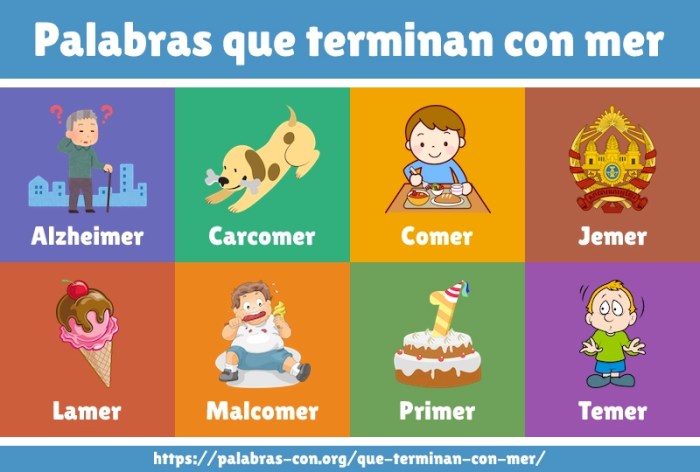Palabras que terminan en ores – Las palabras que terminan en “-ores” son un grupo fascinante de vocablos en español que han cautivado a lingüistas y escritores por igual. Desde sustantivos hasta adjetivos, estas palabras añaden riqueza y profundidad a la lengua española, invitándonos a explorar su estructura, función y significado.
En este artículo, nos adentraremos en el mundo de las “palabras -ores”, descubriendo su morfología, gramática, semántica y evolución histórica. También compararemos estas palabras con sus equivalentes en otros idiomas, destacando sus similitudes y diferencias.
Introduction
In the Spanish language, words that end in “-ores” often refer to nouns that express a collective or abstract concept.
These words typically denote a group of people, things, or ideas that share a common characteristic or are related in some way.
Examples
- Flores (flowers)
- Profesores (teachers)
- Amores (loves)
- Valores (values)
- Errores (errors)
Morphological Analysis

Words ending in “-ores” exhibit a specific morphological structure that involves a root word and a suffix. By analyzing the morphological components, we can gain insights into the word’s meaning and its relationship with other words.
Root Words
The root word forms the core of the word and carries its primary meaning. In words ending in “-ores,” the root word typically denotes an action, a state, or a quality. For example, in the word “adores,” the root word “ador” conveys the concept of worshipping or loving deeply.
Suffixes
The suffix “-ores” is a derivational suffix that is added to the root word to create a noun. This suffix has the function of forming abstract nouns that represent the action, state, or quality expressed by the root word. In the case of “adores,” the suffix “-ores” transforms the verb “adore” into the noun “adores,” which refers to the act of worshipping or loving deeply.
Grammatical Function

Words ending in “-ores” in Spanish can serve various grammatical functions, primarily as nouns, adjectives, or adverbs.
Nouns
As nouns, “-ores” words represent a collective or group of people, places, or things. They often indicate a sense of abundance, excess, or intensity.
- Doctores(Doctors): A group of medical professionals.
- Profesores(Teachers): A collective of educators.
- Amores(Loves): A strong or intense affection.
Adjectives
When used as adjectives, “-ores” words describe nouns by expressing a quality or characteristic that is excessive or extreme.
- Enormes(Enormous): Extremely large or spacious.
- Terribles(Terrible): Very bad or dreadful.
- Peores(Worse): More negative or undesirable.
Adverbs
A few words ending in “-ores” can also function as adverbs, modifying verbs or adjectives to indicate an extreme degree or manner.
- Mejor(Better): To a greater or more desirable extent.
- Peor(Worse): To a lesser or more undesirable extent.
Semantic Analysis

Words ending in “-ores” often convey a sense of abundance, excess, or a large quantity of something. They typically refer to collective nouns, substances, or abstract concepts that are perceived as vast or plentiful.
Common themes in the usage of “-ores” words include:
Collections and Aggregations
- These words describe groups or collections of people, objects, or ideas.
- Examples: flores(flowers), colores(colors), sabores(flavors)
Substances and Materials
- They refer to substances, materials, or mixtures that are typically abundant or occur in large quantities.
- Examples: harinas(flours), aceites(oils), polvos(powders)
Abstract Concepts
- These words represent abstract ideas or qualities that are perceived as vast or boundless.
- Examples: amores(loves), temores(fears), rumores(rumors)
Usage and Distribution

Words ending in “-ores” are commonly found in Spanish texts, particularly in formal and academic writing. Their frequency and distribution vary depending on the specific context and subject matter.
Examples in Different Contexts
- Scientific texts: Investigadores, experimentos, laboratorios
- Historical texts: Emperadores, conquistadores, exploradores
- Legal documents: Demandantes, deudores, acreedores
- Literary works: Amores, dolores, rumores
Historical Evolution
Words ending in “-ores” have a rich historical evolution, tracing their origins to various languages and undergoing significant changes in meaning over time. Their etymological roots can be traced back to Latin, Greek, and French, among others.
Palabras que terminan en “ores”, como “flores” y “colores”, suelen evocar imágenes de belleza y alegría. Sin embargo, existen excepciones como “picaduras”, un recordatorio de los peligros ocultos que acechan en nuestro entorno. En el caso de los perros, las picaduras de arañas pueden ser especialmente preocupantes, por lo que es esencial tomar precauciones para proteger a nuestros peludos amigos de estas amenazas inesperadas.
Volviendo a las palabras que terminan en “ores”, encontramos “sonores”, que nos recuerdan la importancia de la comunicación y la comprensión en todos los aspectos de la vida.
Latin Origins
Many words ending in “-ores” derive from Latin nouns ending in “-or,” denoting an agent or performer of an action. For example, “doctor” (from Latin “doctor,” meaning “teacher”) and “professor” (from Latin “professor,” meaning “one who professes”) both indicate individuals who engage in specific roles or professions.
Greek Origins
Other words ending in “-ores” have Greek origins, often stemming from nouns ending in “-ώρ” (-ōr) or “-τωρ” (-tōr). These words typically denote a person or thing that possesses a particular quality or characteristic. Examples include “oracle” (from Greek “ὀρακλήρ” (oraklēr), meaning “speaker”) and “meteor” (from Greek “μετέωρος” (meteōros), meaning “high in the air”).
French Origins
A smaller number of words ending in “-ores” have French origins, often deriving from nouns ending in “-eur” or “-euse.” These words typically denote a person who performs a specific action or holds a particular position. Examples include “amateur” (from French “amateur,” meaning “lover”) and “entrepreneur” (from French “entrepreneur,” meaning “one who undertakes”).
Semantic Changes, Palabras que terminan en ores
Over time, the meaning of words ending in “-ores” has undergone significant changes. Some words have retained their original meanings, while others have acquired new or extended meanings. For example, “doctor” originally referred to a teacher but now primarily denotes a medical professional.
Similarly, “oracle” initially meant a speaker or interpreter of divine messages but now often refers to any source of reliable information.
Comparative Analysis: Palabras Que Terminan En Ores
Words ending in “-ores” share similarities with their counterparts in other languages, but there are also some key differences. Let’s explore these aspects in more detail.
In terms of morphology, “-ores” words in Spanish often correspond to “-ors” or “-eurs” words in French and “-ors” words in English. For example, the Spanish word “profesores” (teachers) corresponds to the French word “professeurs” and the English word “professors.”
However, there are some exceptions to this rule, such as the Spanish word “colores” (colors), which corresponds to the French word “couleurs” and the English word “colors.”
Grammatically, “-ores” words in Spanish typically function as plural nouns, while their counterparts in other languages can also function as singular nouns. For example, the Spanish word “profesores” can refer to a group of teachers or a single teacher, while the French word “professeurs” and the English word “professors” typically refer to a group of teachers.
Semantically, “-ores” words in Spanish often have a similar meaning to their counterparts in other languages. For example, the Spanish word “colores” means “colors” in English and “couleurs” in French. However, there are some cases where the meaning of a “-ores” word in Spanish can be different from its counterpart in another language.
For example, the Spanish word “amores” means “love” in English, but it can also mean “lovers” in Spanish.
FAQs
¿Qué son las “palabras-ores”?
Las “palabras -ores” son palabras en español que terminan en el sufijo “-ores”. Pueden ser sustantivos, adjetivos o adverbios.
¿Cuál es la función gramatical de las “palabras-ores”?
Las “palabras -ores” pueden funcionar como sustantivos (por ejemplo, “profesores”), adjetivos (por ejemplo, “mejores”) o adverbios (por ejemplo, “peores”).
¿Cuál es el significado semántico de las “palabras-ores”?
Las “palabras -ores” suelen expresar conceptos relacionados con la comparación, la cantidad o la cualidad. Por ejemplo, “mejores” significa “de mayor calidad”, mientras que “menores” significa “de menor cantidad”.